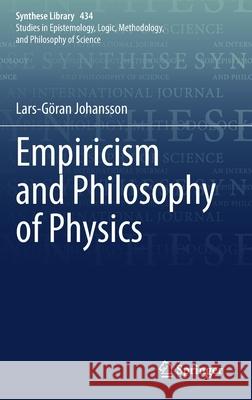Empiricism and Philosophy of Physics » książka



Empiricism and Philosophy of Physics
ISBN-13: 9783030649524 / Angielski / Twarda / 2021 / 291 str.
Empiricism and Philosophy of Physics
ISBN-13: 9783030649524 / Angielski / Twarda / 2021 / 291 str.
(netto: 460,04 VAT: 5%)
Najniższa cena z 30 dni: 462,63
ok. 22 dni roboczych.
Darmowa dostawa!
Wydanie ilustrowane
"Johansson has written an insightful and significant book in which he presents a strong empiricist approach to philosophy of physics. What I especially like about this book is that the author sees many of the most central issues in philosophy of physics ... . this book will receive attention not only from philosophers but from realist-minded physicists as well." (Jan Faye, Metascience, October 12, 2022)
"A highly engaging reading ... . the book has a wide scope, dealing with many interesting problems, appealing to many distinct sources, to finally bring in a unified naturalistic solution to those problems. It will certainly be useful for many different kinds of readers; even though it is not an introductory book, the presentation is quite friendly, and the themes dealt with are probably some of the most important in the area today." (Jonas Rafael Becker Arenhart, Mathematical Reviews, June, 2022)
After receiving a Ph.D in theoretical philosophy from Stockholm University 1993 I was lecturer in theoretical philosophy at Linköping University 1995-2001, after which I moved to Uppsala University, where I became full professor 2008. My research interests are epistemology, philosophy of science and in particular philosophy of physics. I have extensively taught philosophy of science also at Karolinska Institute, Stockholm, Royal University of Technology in Stockholm and Swedish University for Agricultural Sciences in Uppsala.
This book presents a thoroughly empiricist account of physics. By providing an overview of the development of empiricism from Ockham to van Fraassen the book lays the foundation for its own version of empiricism. Empiricism for the author consists of three ideas: nominalism, i.e. dismissing second order quantification as unnecessary, epistemological naturalism, and viewing classification of things in natural kinds as a human habit not in need for any justification.
The book offers views on the realism-antirealism debate as well as on the individuation of theories as a thoroughly neglected aspect of underdetermination. The book next discusses a broad range of topics, including the predicates body, spatial distance and time interval, the ontology of electromagnetism, propensities, the measurement problem and other philosophical issues in quantum theory. Discussions about the direction of time and about string theory make up the final part of the book.
1997-2026 DolnySlask.com Agencja Internetowa
KrainaKsiazek.PL - Księgarnia Internetowa









